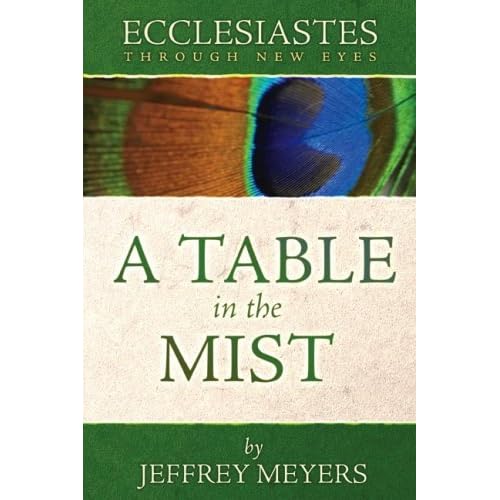Thoughts on Wisdom, a Few Quotes, and a Little Poetry
 Today I finished reading "A Table in the Mist: Ecclesiastes Through New Eyes" by Jeffrey Meyers. This is a book I would highly recommend to anyone interested in a more thorough approach to Ecclesiastes or just interested in wisdom in general. Meyers takes the view that Ecclesiastes is indeed a book of true biblical wisdom, written in faith for those with faith. This less popular exegetical approach is opposed to the more often expressed idea that Ecclesiastes is written from a pagan or skeptic view of the world to express what life is like without faith in the Triune God. Meyers argues that Solomon (if I may assume his authorship for now) would challenge us to see that life is even "vapor" for those in faith. All of life is "vapor" . . . for us, but, "Time and events are not vapor for God, only us." What Solomon does argue is that all of life is not vapor but is full of meaning, but only to God because He will judge all things; and we must see life in relationship to God's Sovereignty if we are to have meaning in life.
Today I finished reading "A Table in the Mist: Ecclesiastes Through New Eyes" by Jeffrey Meyers. This is a book I would highly recommend to anyone interested in a more thorough approach to Ecclesiastes or just interested in wisdom in general. Meyers takes the view that Ecclesiastes is indeed a book of true biblical wisdom, written in faith for those with faith. This less popular exegetical approach is opposed to the more often expressed idea that Ecclesiastes is written from a pagan or skeptic view of the world to express what life is like without faith in the Triune God. Meyers argues that Solomon (if I may assume his authorship for now) would challenge us to see that life is even "vapor" for those in faith. All of life is "vapor" . . . for us, but, "Time and events are not vapor for God, only us." What Solomon does argue is that all of life is not vapor but is full of meaning, but only to God because He will judge all things; and we must see life in relationship to God's Sovereignty if we are to have meaning in life.This may lead us next to the question of how we live by faith and seek wisdom in light of God's Sovereignty.
"Remember this theme in Ecclesiastes - the wise man is precisely the one who confesses ignorance of the future and who trusts God. Even the wise man remains ignorant of the appropriate times for action because God has not given access to the details of his plans; even a wise man has no privileged knowledge of God's purposes and plans. It is impossible for men to make use of the way in which the world has been organized, because God has deliberately withheld the knowledge of it. God has deliberately kept man in ignorance of the things that he needs to know in order to live with absolute security and uninterrupted success (read Eccl. 9:11). The wise man knows he is never in a position to stop trusting God. The wise man admits he has no control, no leverage over God and his creation, and so does not make brash, stupid claims about what he is going to do and accomplish."This statement should remind us that a wise man will put his complete trust in the Lord in all things and at all times, seek to be generous with what he is given, and strive to enjoy all of God's earthly blessings.
"Go, eat your bread in joy, and drink your wine with a merry heart, for God has already approved what you do. "Let your garments be white. Let not oil be lacking on your head.Sam has a great, short post (here) on a foolish man's striving and a bit of wise advice from the writings of Samuel Johnson that follows this discussion well.
"Enjoy life with the wife whom you love, all the days or your [vaporous] life that he has given you under the sun, because that is your portion in life and in your toil at which you toil under the sun. Whatever your hand finds to do, do it with your might, for there is no work or thought or knowledge or wisdom in Sheol, to which you are going." (Ecclesiastes 9:7-10)
I will end with a poem by Percy Bysshe Shelley entitled "Ozymandias" that I believes shows some of the foolishness of man's hubris that Solomon is warning against. (I have only come across this poem thanks to George Grant's Giles Kirk Antiquity Curriculum.)
I met a traveler from an antique land
Who said: Two vast and trunkless legs of stone
Stand in the desert . . . Near them, on the sand,
Half sunk, a shattered visage lies, whose frown,
And wrinkled lip, and sneer of cold command,
Tell that its sculptor well those passions read
Which yet survive, stamped on these lifeless things,
The hand that mocked them, and the heart that fed:
And on the pedestal these words appear:
"My name is Ozymandias, king of kings:
Look on my words, ye mighty, and despair."
Nothing besides remains. Round the decay
Of that colossal wreck, boundless and bare
The lone and level sands stretch far away.

